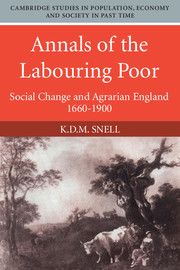Book contents
- Frontmatter
- Contents
- Preface
- Introduction
- 1 Agricultural seasonal unemployment, the standard of living, and women's work, 1690–1860
- 2 Social relations – the decline of service
- 3 Social relations – the poor law
- 4 Enclosure and employment – the social consequences of enclosure
- 5 The decline of apprenticeship
- 6 The apprenticeship of women
- 7 The family
- 8 Thomas Hardy, rural Dorset, and the family
- Appendix: yearly wages
- Bibliography
- Index
- Cambridge Studies in Population, Economy and Society in Past Time 2
3 - Social relations – the poor law
Published online by Cambridge University Press: 05 March 2012
- Frontmatter
- Contents
- Preface
- Introduction
- 1 Agricultural seasonal unemployment, the standard of living, and women's work, 1690–1860
- 2 Social relations – the decline of service
- 3 Social relations – the poor law
- 4 Enclosure and employment – the social consequences of enclosure
- 5 The decline of apprenticeship
- 6 The apprenticeship of women
- 7 The family
- 8 Thomas Hardy, rural Dorset, and the family
- Appendix: yearly wages
- Bibliography
- Index
- Cambridge Studies in Population, Economy and Society in Past Time 2
Summary
According to The Times, in its 1844 enquiry into rural incendiarism, there were four causes of the arson which had become so widespread in the southern agricultural counties. These were exceptionally low wages; the decline of farm service; the enclosure of open fields, commons, and wastes; and antagonism to the New Poor Law alongside its detrimental effect on employment. The first three of these causes are dealt with in other chapters, and I want here to discuss the poor law. The subject has an extensive historiography, and it is not my intention to outline relief administration during this period. The wide variety of practice; the nature and effects of Speenhamland and associated policies; the dubious credibility of the Poor Law Report of 1834 – such aspects have been covered by other historians. I want rather to emphasise factors hitherto rather neglected, and consider the effects of the law on the quality of life: on wages and employment, work discipline, the treatment of the elderly, and, primarily, on the quality of social relationships.
The old poor law provides the key to a social understanding of the eighteenth century. Parochial organisation ensured a face to face connection of administrators and the poor; while generous terms of relief and often humble officers facilitated agreement and mutual respect between the ranks and orders of parish society.
- Type
- Chapter
- Information
- Annals of the Labouring PoorSocial Change and Agrarian England, 1660–1900, pp. 104 - 137Publisher: Cambridge University PressPrint publication year: 1985
- 3
- Cited by



